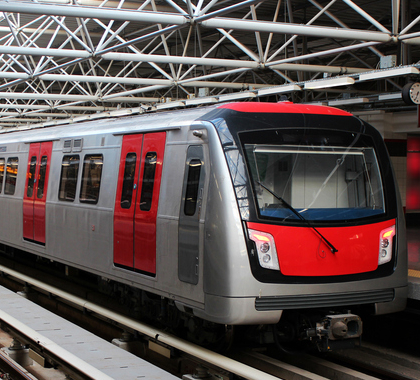California landowners who had their land seized years ago through eminent domain for the state’s high-speed rail project are still waiting to be paid for the expenses owed them, for land the state might never even get around to using.
As part of the process for building a proposed high speed rail project from San Francisco to Los Angeles, the state seized many farmers’ and ranchers’ properties, using orders of possession from California’s Superior Court.
For years, California has delayed negotiations with landowners for the reimbursement of expenses related to the transfer of ownership, such as road replacement, repositioning of irrigation systems, tree clearing, lost production, and even payments for land seized, and now much of the land is unlikely ever to be used for the rail project.
‘Crass Lack of Concern’
One farmer has been waiting three years for the $1.9 million compensation California owes him for the taking of his land and associated expenses, the Los Angeles Times reports.
The state has even stiffed farmers who voluntarily agreed to sell their land for the rail project. Among these is one farmer who voluntarily sold some of his land to the state for $630,000 and has gone unpaid for three years, the Times reports.
The landowners’ plight is one injustice heaped upon another, says Adrian Moore, vice president of the Reason Foundation.
“Taking people’s property against their will is harsh enough, but failing to pay them for it, and for the related costs the seizure imposes, is mindboggling,” said Moore. “The crass lack of concern by state leaders for the lives they damage in pursuit of their political dreams is stunning.”
All Pain, No Train
California’s high speed rail project has proven to be an expensive unfulfilled fantasy, says Moore.
“The California high speed rail project was always very questionable in terms of benefits, as studies by Reason [Foundation], and by others as well, demonstrated,” said Moore. “There exist alternative routes using rights of way the state already possesses, but those routes didn’t interest political planners in the grip of the fantasy of a high speed train connecting Los Angeles and San Francisco, with the ability to stop at all the small farming towns of the Central Valley, which kind of defeats the purpose of competing with airline flights for rapid transport.”
Moore says everyone except the most fanatical supporters of the project now knows it won’t be built, so the seizures were all for nothing.
“Seizing people’s land under eminent domain is supposed to be a last resort to build necessary public infrastructure,” said Moore. “The optimistic planning, ignoring of insurmountable engineering problems, and blatant underestimating of costs has come home to roost, and the project is grinding to a halt, so these farmers and landowners will have suffered unpaid for years at who knows what real cost, for nothing.
“Well, maybe they’ll make a nice bike trail out of it,” Moore said.
‘Lies Piled on Top of Lies’
California’s high-speed rail project is a story of government inefficiency, massive cost overruns, and ultimately the abuse of government power, says Lawrence J. McQuillan, director of the Center on Entrepreneurial Innovation at the Independent Institute.
“The project was sold to voters using lies piled on top of lies,” said McQuillan. “And when the lies were exposed, judges refused to halt the project, and voters thus far have not been allowed to revote on the project.
“Also, the government has abused its eminent domain power by not promptly paying private landowners, many of them farmers, for the land seized and expenses incurred, which is unfair and unjust,” McQuillan said. “Some farmers have waited more than three years for proper compensation, and some seized land will never be used for the HSR project. It will sit barren, a waste of previously productive farmland. Justice delayed is justice denied.”
Matter of Interest
California owes farmers for more than just the cost of the land it took from them, says McQuillan.
“In addition to the millions of dollars the State of California owes farmers for the land it seized for the high speed rail project and for other out-of-pocket expenses related to the land grab, California should also have to pay landowners interest on the money owed to them,” McQuillan said. “Legal action might be the only way for farmers and other landowners to receive full compensation.”
Farmers have been victimized by an unnecessary land grab, says Kerry Jackson, a fellow in California studies at the Pacific Research Institute.
“The Constitution says farmers are due just compensation, but they have been treated unjustly by a government which entered into a project it was hardly ready to start, much less finish,” Jackson said.
‘Smoke and Mirrors’
California’s high-speed rail project was an unrealistic pipedream from beginning to end, says McQuillan.
“The California high-speed rail project was, and continues to be, a boondoggle sold to voters using lies about its speed, ridership, financing, and cost,” said McQuillan. “Not a single penny of private money has been invested, and now the original price tag of the San Francisco to Los Angeles buildout has risen from $45 billion to more than $100 billion.
“It was sold using smoke and mirrors, and now that the smoke has cleared and reality has set in, even Gov. Gavin Newsom has decided to scale the project back to a single leg between Bakersfield and Merced,” McQuillan said. “It is past time to pull the plug on the so-called high-speed train.”
Kenneth Artz ([email protected]) writes from Dallas, Texas.
INTERNET INFO
Elaine M. Howie, “California High‑Speed Rail Authority,” California State Auditor, November 15, 2018: https://heartland.org/publications-resources/publications/audit-report-california-high-speed-rail





